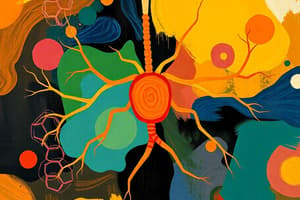Podcast
Questions and Answers
Describe the functions of the endocrine system.
Describe the functions of the endocrine system.
- Collection of glands and organs, 2. Secrete chemical messengers, 3. Send signals from one part of the body to another for regulation and coordination of various activities.
What are some things that the endocrine system affects?
What are some things that the endocrine system affects?
- Metabolism, 2. Growth, 3. Blood pressure.
How do hormones travel via endocrine glands?
How do hormones travel via endocrine glands?
Through the blood without a duct.
What do endocrine glands secrete?
What do endocrine glands secrete?
What is a chemical messenger that enters the blood, which carries them from their site of secretion to the cells upon which they act?
What is a chemical messenger that enters the blood, which carries them from their site of secretion to the cells upon which they act?
Do hormones link various organ systems together?
Do hormones link various organ systems together?
What is an example of an exocrine gland?
What is an example of an exocrine gland?
What are the three chemical classes of hormones?
What are the three chemical classes of hormones?
What are the derivatives of amine hormones?
What are the derivatives of amine hormones?
What are the two major categories of amine hormones?
What are the two major categories of amine hormones?
What are two types of catecholamines?
What are two types of catecholamines?
What category are most hormones?
What category are most hormones?
Describe peptide and protein hormones.
Describe peptide and protein hormones.
What is an example of peptide and protein hormones?
What is an example of peptide and protein hormones?
What are the derivatives of steroid hormones?
What are the derivatives of steroid hormones?
What are four examples of steroid hormones?
What are four examples of steroid hormones?
Where are steroid hormones produced?
Where are steroid hormones produced?
How are steroid hormones produced?
How are steroid hormones produced?
Describe the nature of steroid hormones.
Describe the nature of steroid hormones.
What are the regions of the adrenal cortex?
What are the regions of the adrenal cortex?
What steroids does the cortex produce?
What steroids does the cortex produce?
What does aldosterone affect?
What does aldosterone affect?
What controls aldosterone?
What controls aldosterone?
What affects metabolism of glucose and other organic nutrients and reduces inflammation and dampens the immune system?
What affects metabolism of glucose and other organic nutrients and reduces inflammation and dampens the immune system?
What does the medulla produce?
What does the medulla produce?
What regulates secretion of anterior pituitary gland hormones?
What regulates secretion of anterior pituitary gland hormones?
What are the mechanisms of hormone action for peptides and catecholamines?
What are the mechanisms of hormone action for peptides and catecholamines?
What are the mechanisms of hormone action for steroids and thyroid hormones?
What are the mechanisms of hormone action for steroids and thyroid hormones?
What does increasing the number of a hormone's receptors in a cell, often resulting from prolonged exposure to a low concentration of the hormone, refer to?
What does increasing the number of a hormone's receptors in a cell, often resulting from prolonged exposure to a low concentration of the hormone, refer to?
What does decreasing receptor number, often from exposure to high concentrations of the hormone, refer to?
What does decreasing receptor number, often from exposure to high concentrations of the hormone, refer to?
True/False: All anterior pituitary hormones are amine.
True/False: All anterior pituitary hormones are amine.
What are the six hormones of the anterior pituitary gland?
What are the six hormones of the anterior pituitary gland?
What secretes hypophysiotropic hormones?
What secretes hypophysiotropic hormones?
Where are the hormones of the posterior pituitary gland produced?
Where are the hormones of the posterior pituitary gland produced?
What are the two hormones of the posterior pituitary gland?
What are the two hormones of the posterior pituitary gland?
Study Notes
Functions of the Endocrine System
- Consists of glands and organs that regulate bodily functions
- Secretes hormones as chemical messengers
- Coordinates and regulates various physiological activities by sending signals throughout the body
Effects of the Endocrine System
- Influences metabolism
- Regulates growth
- Affects blood pressure
Hormone Transport and Characteristics
- Hormones travel through the bloodstream without ducts
- Endocrine glands secrete hormones directly into blood
- Hormones are soluble in blood, either free or bound to transport proteins
Hormones Classification
- Three main chemical classes:
- Amine hormones, derived from tyrosine
- Peptide and protein hormones, composed of short chains of amino acids
- Steroid hormones, derived from cholesterol
Gland Functions and Hormone Production
- Steroid hormones are primarily produced in:
- Adrenal cortex
- Gonads
- Placenta
- Adrenal cortex specifically produces hormones like:
- Aldosterone (regulates sodium and potassium balance)
- Cortisol (manages glucose metabolism and stress response)
- Androgens (male sex hormones)
Regulation of Hormones
- Hormones can increase or decrease their receptor sensitivity:
- Up-regulation: Increases target cell responsiveness due to prolonged low hormone levels
- Down-regulation: Decreases target cell responsiveness due to prolonged high hormone levels
- Hormone secretion controlled by:
- Plasma concentrations of ions/nutrients
- Neurotransmitters
- Other hormones (tropic hormones)
Endocrine Disorders
- Hyposecretion: Glands produce too little hormone, can be primary or secondary
- Primary hyposecretion indicates a malfunctioning gland
- Secondary hyposecretion results from insufficient tropic hormone stimulation
- Hypersecretion: Excessive hormone production, can result from tumors
- Hyporesponsiveness: Target cells fail to respond adequately to hormones, leading to conditions like Type II Diabetes
- Hyperresponsiveness: Target cells overreact to hormones
Hormonal Interaction and Action Mechanisms
- Steroid and thyroid hormones penetrate target cell membranes and affect gene transcription directly.
- Peptide and catecholamine hormones bind to cell membrane receptors, activating second messenger systems.
- Hormone metabolism and clearance depend on secretion rates and cellular uptake, as well as the presence of receptors.
Anterior Pituitary Gland Hormones
- Produces six key hormones:
- FSH: Gamete production
- LH: Sex hormone production
- GH: Growth and metabolism
- TSH: Stimulates thyroid hormone release
- Prolactin: Milk production and breast development
- ACTH: Promotes cortisol release
Hypothalamic Regulation
- Hypophysiotropic hormones from the hypothalamus regulate anterior pituitary hormone secretion.
- Anterior pituitary hormones control other endocrine glands, creating feedback loops for hormonal regulation.
Posterior Pituitary Hormones
- Hormones are produced in the hypothalamus nuclei and secreted by the posterior pituitary.
- Key hormones include:
- ADH: Regulates water balance
- Oxytocin: Involved in childbirth and lactation
Summary of Hormonal Actions
- Hormones produce cellular responses by binding to specific receptors.
- Hormone activity is influenced by receptor presence and hormonal concentration.
- Mechanisms include stimulation or inhibition of target cells based on overall hormonal balance.
Studying That Suits You
Use AI to generate personalized quizzes and flashcards to suit your learning preferences.
Description
Explore the key concepts of the endocrine system with these flashcards. Each card highlights the functions of the system, its effects on the body, and the role of hormones. Perfect for revision and understanding vital physiological processes.



